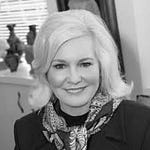“In a world of shrinking yields, we are ripe for a monetary regime shift”
Our podcast this week features an interview with James Bianco , market-savvy macro-economic analyst and head ofBianco Research here in Chicago. He shares his thoughts about the Fed, markets, the long-lost world of stock picking, and the role of cryptocurrencies as a new monetary regime unfolds.
During our interview last Friday, I asked Jim what he would do in terms of monetary policy if he were appointed to the Fed. Unknown to me was the fact that he was under active consideration at the time. As he has now revealed on Bloomberg today:
“Before I offer thoughts on the just Fed nominees, and the challenges they face, some full disclosures are in order. I interviewed for one of the open Governor positions at the White House in Late May. I have an unconventional background for a Fed Governor as I am not a PhD. in economics. Instead I have 29 years of experience on Wall Street and running my own market advisory service commenting on markets and Fed policy. But that was the point! I am different and it was time to break the mold for picking Fed policymakers. I thank the White House for inviting me in and listening to my ideas and giving them serious considerations.”
Before the nominations of Judy Shelton and Christopher Waller were announced, Jim agreed that the Fed board does not need to be comprised exclusively of PhD economists. This distinction also applies to Christine Lagarde, recently nominated as head of the ECB, who (like her counterparts Jerome Powell and Haruhiko Kuroda) is a lawyer rather than an economist. Is this a realization that regulation is now more important than economic theory?
Some key points made during the podcast: Fed communications policies are behind the times in this era of social media. These policies isolate the central bank from the public at large, and critically, from market participants.
We explored the productivity puzzle and why inflation is so persistently low in the US. The answer revolves around the fact that all markets are now interconnected, and lagging growth in one affects the entire ecosystem. The US is now the outlier, but cannot remain so for much longer. The yield curve is saying that the Fed policy rate is too high.
The current global monetary regime began back in 1971, and Jim explains why it is time for a change. He believes that low interest rates mean that the old rules don’t apply as we approach Jay Powell’s Effective Lower Bound. He raises a cautionary note about negative interest rates, which bring guaranteed losses. Among other statistics in the interview: 94% of developed world sovereign debt yields a negative return.
Finally we delved into cryptocurrencies. In a world of QE, with banks under pressure from lower interest rates, the only alternative to the current system of fractional reserve banking is the Chicago School, and a fully reserved currency such as Libra. Cryptocurrencies are stepping into the breach caused by this negative rates, and will be a gamechanger. Importantly, cryptocurrencies are also a possible alternative to the US dollar as a reserve currency. These innovative payments systems also open a new avenue for business plans, including instant micropayments, enabling sustainable low margins but on a gigantic scale.
For another view on Libra, you won’t want to miss Karen Petrou’s recent article in American Banker, The Existential Threat of Facebook's Digital Currency. Also Bloomberg’s I Tried Using Facebook's Libra and it Didn't Work by Elaine Ou, a blockchain engineer.
I think you will find this interview well worth your time. And speaking about monetary independence, we wish you a very Happy 4th of July!













